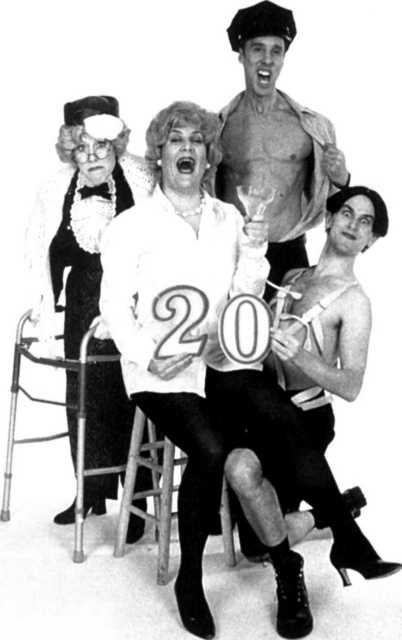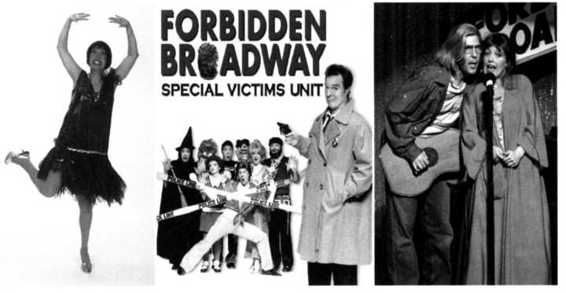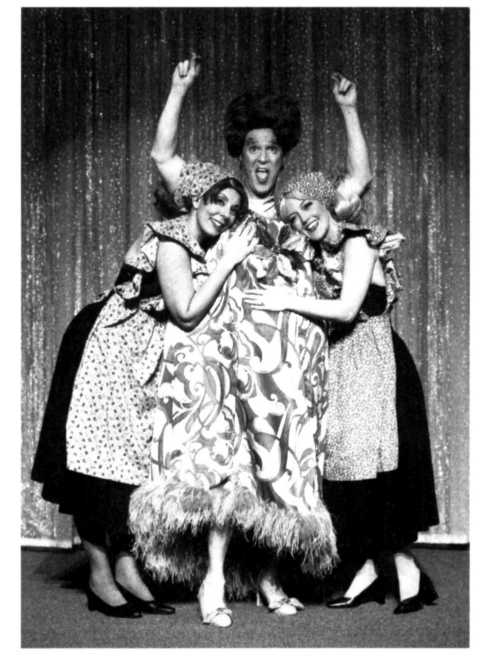Forbidden Broadway: Behind the Mylar Curtain (91 page)
Read Forbidden Broadway: Behind the Mylar Curtain Online
Authors: Gerard Alessandrini,Michael Portantiere

While in college, I first saw Forbidden Broadway and
marveled at the hysterically witty writing and the brilliant performances, never dreaming that years later I
would join the ranks for two incarnations. Physically,
vocally, and mentally, it was the most challenging and
exhausting work I have ever experienced, and I loved
every minute. Having already performed on Broadway, I think I was the only cast member to spoof two
shows that I had actually been in-and they were both
still running at the time!
Previews were hard, as the show was daily tweaked
and perfected. For about a month of performances,
new numbers were written, rehearsed, and sometimes
put into the show within a day or so. The running order would change constantly, and due to the crazed
state the actors were in, sometimes the only way we
could remember the lineup was because the dresser
had placed our costumes in order over our dressing
room chairs.
There should be a CD of numbers that were cut
from the show or never made it in. I loved playing
"Anita Fix," the non-Equity, triangle playing waitress/
Kit Kat girl in the Cabaret revival parody. The most
twisted song we ever had-I don't think it was ever
completely written, much less staged-was about
the Rent phenomenon and Jonathan Larson: "Nice work if you can get it, and you
can get it if you die." Instant red light.
We learned one big number because Carol Channing was coming to see the show.
It was right when Dolly the sheep was cloned, and we played cloned "Dolly Levis" in
sheep masks. That number stayed in the show for only a few days. When we spoke
with Carol afterwards, the following dialogue occurred:
CAROL CHANNING: How do you do all those impersonations? It's just
astounding.
TOM PLOTKIN: Actually, Ms. Channing, I'm having vocal problems and I'm
on prednisone.
CAROL: Prednisone? Don't ever, ever take prednisone.
TOM: Why not?
CAROL: I used to be five foot two!
One night, Christine Pedi had a severe costume malfunction and didn't make
it onstage for the end of the Disney parody. Donna English, Bill Selby, and I nobly
kept trying to continue, but the number was going way south; we ran out of stalling
improv lines, and we were standing onstage with egg all over our faces. Then, after a
pregnant pause, Bill blurted out: "I know a joke." The rest of us ran offstage, leaving
him to tell it.
I will always treasure meeting Bob Hope, Elaine May, Chita Rivera, and Stephen
Sondheim at the show. Carol Burnett's iconic laughter during Forbidden Broadway:
Cleans Up ItsActwill ring in my ears forever. But my favorite memory of the show involves my friend Gerard. In 2003, my partner and I opened a business in my hometown
of New Orleans. Two years later, Katrina's floodwaters devastated the city, and while
I was evacuated to NYC, Gerard called and offered me a job in Forbidden. He was the
only person to do so. I am forever grateful for the years of friendship and fun.
We moved Forbidden Broadway to the Douglas Fairbanks
Theatre on 42nd Street in May 2001. Then 9/ 11 happened.
That was a Tuesday, and we canceled the show that night
and for the next two nights. There was a feeling that no one
would want to go to the theatre anymore. I thought, "Oh
my God, we're doing a comedy at this tremendously tragic
time." I remember my mother saying to me, "Well, Gerard,
it took a bomb to close your show."
I went to the theatre on Friday for our first performance
after 9/11, because I wanted to see how the show would
play. The house was about a quarter full, which was small
for a Friday night. Then the show started-and it seemed
funnier and better than ever. It suddenly went over like a
great celebration of New York and American musical theatre. For that whole year following, all this love came forward from the audience. We did great business for the next
few years.

Donna English, Kristine Zbornik, Michael West,
and Daniel Reichard celebrate our twentieth
anniversary.
The world situation was so serious that people seemed to
be hungry for light entertainment-the lighter and fluffier,
the better. This may partly explain the critical success of
shows like Mamma Mia!, Thoroughly Modern Millie, and of
course Forbidden Broadway. It was at this point that "metamusicals" really began to proliferate.
I believe Broadway is at its best when there are many types of shows running. In
the early 2000s, almost all the new entries were big, bright, funny meta-musicals. Uri-
netown had the look and pretense of a dark, serious piece but in fact was a spoof that included allusions to West Side Story and other well-known musicals. The Producers
and Spamalot were on the horizon, and there was even more to come.

From left: Valerie Fagan as Sutton Foster in "Thoroughly Perky Millie." Poster for Forbidden
Broadway: Special Victims Unit. Ron Bohmer and Jennifer Simard murder Assassins.
Shows like The Producers and Wicked were great for Broadway and for us. Everyone knew them, and they had a lot of star power in Nathan Lane, Matthew Broderick,
Kristin Chenoweth, and Idina Menzel. Again, the success of Forbidden Broadway
doesn't necessarily depend on our audience having seen the shows; they just have to
be aware of them and have heard all the buzz and hype.
I remember thinking that our show was like Law & Order: Both were New York
institutions and basically trod the same path over and over, with some new variations. Broadway legend Jerry Orbach was the star of Law & Order at that point, so I
wanted to put that show and ours together in some way. Also, after seeing certain
Broadway shows, I would joke that the producers or directors should be criminally
charged for what they had done. That's how I came up with the title Forbidden
Broadway: Special Victims Unit.
We skewered shows like IAm My Own Wife, Movin'Out, and the Fiddler on the Roof
revival that reinterpreted that beloved musical to a fault. Bombay Dreams was one
of the last big imports from London; it wasn't especially good, but it was a new book
musical, and it actually had a story. Lennon was one of those rare exceptions where
we targeted a flop. We spoofed Yoko Ono, who turned out to be probably the most
spoofable celebrity since Liza.
The economics of theatre have changed so much since our show first opened. If
you have to raise so much money to do an Off-Broadway show, why not raise a little
more and put it on Broadway? In the '90s, you were able to do a big Off-Broadway show
for about $300,000. You can't do that now; you need at least a million. I don't know
exactly why the costs zoomed so high, but they did-and it seemed like it happened
almost overnight, around 2002.
Today's audiences want "The
Broadway Experience." There was a
time when people would seek out
underground, innovative, subversive
fare, but now the industry is largely
tourist-driven. Younger New Yorkers
are going to Starbucks or clubs, or
they're at the gym or the computer.
The basic New York audience that
sustained Broadway and Off-Broadway shows for decades is vanishing.

Harvey Fierstein (Ron Bohmer) joins the cast of
Fiddler on the Roof.
There were a lot of jukebox musicals on Broadway at the turn of the
century, and we felt compelled to
spoof all of them. We had very funny
parodies of Doubt and Virginia Woolf,
shows that were made for the Forbidden Broadway treatment. (Some
plays are actually much easier for
us to spoof than musicals.) But I do
wish there were more stars on Broadway. I really respect Patti LuPone and Bernadette Peters for dedicating their
talents to the stage.
